新目标初三英语unit4单元复习
新目标初三英语unit4单元复习

新目标英语九年级Unit4-Unit5-Unit6知识点总复习和范文
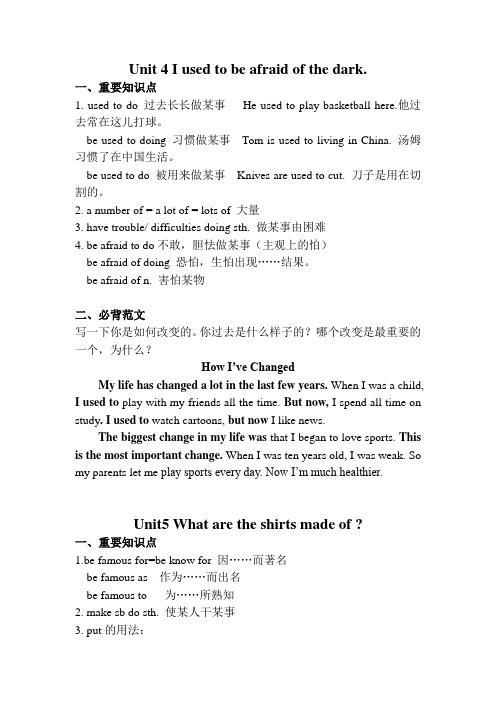
Unit 4 I used to be afraid of the dark.一、重要知识点1. used to do 过去长长做某事He used to play basketball here.他过去常在这儿打球。
be used to doing 习惯做某事Tom is used to living in China. 汤姆习惯了在中国生活。
be used to do 被用来做某事Knives are used to cut. 刀子是用在切割的。
2. a number of = a lot of = lots of 大量3. have trouble/ difficulties doing sth. 做某事由困难4. be afraid to do不敢,胆怯做某事(主观上的怕)be afraid of doing 恐怕,生怕出现……结果。
be afraid of n. 害怕某物二、必背范文写一下你是如何改变的。
你过去是什么样子的?哪个改变是最重要的一个,为什么?How I’ve ChangedMy life has changed a lot in the last few years. When I was a child, I used to play with my friends all the time. But now, I spend all time on study. I used to watch cartoons, but now I like news.The biggest change in my life was that I began to love sports. This is the most important change. When I was ten years old, I was weak. So my parents let me play sports every day. Now I’m much healthier.Unit5 What are the shirts made of ?一、重要知识点1.be famous for=be know for 因……而著名be famous as 作为……而出名be famous to 为……所熟知2. make sb do sth. 使某人干某事3. put的用法:Put on 穿上,put up 建造,put out 熄灭,put off 推迟,put down 放下,put away 收起来4. be allowed to do sth. 被允许做某事5. be covered with…被……覆盖二、重要语法:一般现在时的被动语态当主语为动作的执行者时, 谓语的形式为主动语态; 当主语为动作的承受者时, 谓语要用被动语态。
人教新目标英语九年级Unit4 复习学案(含答案)
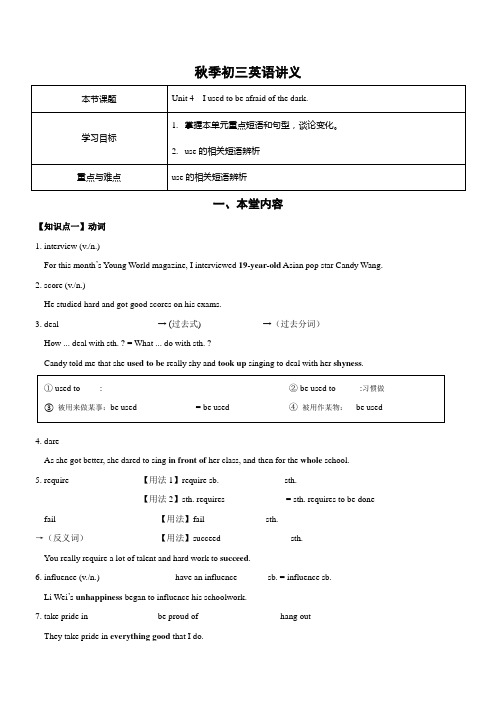
秋季初三英语讲义一、本堂内容【知识点一】动词1. interview (v./n.)_______________For this month’s Young World magazine, I interviewed 19-year-old Asian pop star Candy Wang.2. score (v./n.) _____________He studied hard and got good scores on his exams.3. deal _______________ → (过去式) ___________ →(过去分词)________How ... deal with sth. ? = What ... do with sth. ?_____________Candy told me that she used to be really shy and took up singing to deal with her shyness.① used to ____:__________________ ② be used to _____:习惯做③被用来做某事:be used ___________ = be used ___________ ④被用作某物:be used ___________4. dare ______________As she got better, she dared to sing in front of her class, and then for the whole school.5. require _____________ 【用法1】require sb. ______________ sth.【用法2】sth. requires _____________ = sth. requires to be donefail ______________ 【用法】fail _____________ sth.→(反义词)_____________ 【用法】succeed _______________ sth.You really require a lot of talent and hard work to succeed.6. influence (v./n.) _____________ have an influence ______ sb. = influence sb.Li Wei’s unhappiness began to influence his schoolwork.7. take pride in _____________ be proud of _____________ hang out _____________They take pride in everything good that I do.8. in person _____________ in public _____________ from time to time _____________【课堂练习】用所给词的适当形式填空,每词限用一次。
Unit 4 (单元复习课件)-九年级英语全一册(人教新目标Go for it!)
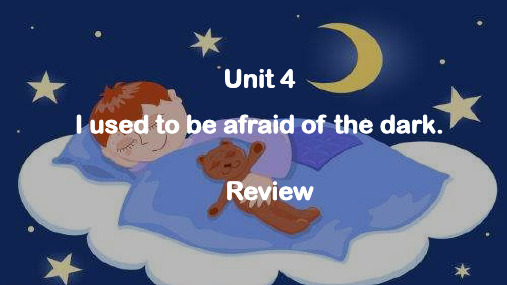
审题 1.审主题: 我的变化 2. 审体裁: 说明文 3.审人称: 第一人称 4.审时态: 一般过去时,一般现在时 5. 审要点: 过去与现在的对比
Writing
Follow the prompts to write an article to talk about your change.
A.Even
B.Even though C.If
D.Unless
(A)4. You can made a _____ instead of him.He doesn't have to go
there_____ person.
A.decision;in B.decide;in C.decision;by D.decide;by
05 Writing
Writing
Write about how you have changed. What did you use to be like? Which change is the most important one and why?
Try to write two paragraphs. Paragraph 1: General introduction about the changes in your life Paragraph 2: The most important
Language points
Point 7.Now she’s not shy anymore and loves singing in front of crowds. not ... anymore = no more,不再 e.g:He doesn't come late anymore.
Unit 4单元练习 2021—2022学年人教新目标九年级英语全册

Unit 4I used to be afraid of the darkⅠ.单项选择(共10小题;每小题1分,满分10分)()1.David is from European country while his wife is from African country.A.a; aB.a; anC.an; aD.an; an()2.—Why were you absent the meeting yesterday?—Because I had a bad cold.A.aboutB.toC.ofD.from()3.—What is the man like?—He is and he often tells us funny jokes.A.strictB.humorousC.shyD.worried()4.—he's 24 now, he's still like a little child.—Well, that's because he depends on his parents for almost everything.A.As long asB.As soon asC.Even thoughD.Ever since()5.—Will you please give me a(n) about the art museum?—Of course. There are lots of famous paintings in it.A.actionB.introductionC.symbolD.change()6.—How often do you go skating?—I go skating because I can't skate. I think it's the most difficult sport.A.alwaysuallyC.oftenD.seldom()7.My uncle used on the right in China, but he soon got used on the leftin England.A.to drive; to driveB.to driving; to drivingC.to driving; to driveD.to drive; to driving()8.You'd better have a talk with him . He only listens to you.A.in silenceB.in troubleC.in personD.in order()9.He realized he was wrong and the argument.A.gave upB.cheered upC.put upD.took up()10.—I heard that Kate the English singing competition.—Let's go and cheer her up.A.failedB.expectedC.passedD.consideredⅡ.完形填空(共10小题;每小题2分,满分20分)I'm in my middle fifties and I don't feel old yet. However, sometimes I look back at my childhood and compare things with the way of life of today's kids. Some things have 11 changed.One area of change is television. Some changes have been improvements. Some changes, however, have been 12.When I started school, most families in my village didn't have a television; televisions were just beginning to get 13. They were new and expensive. My father saved money for a whole year and bought a small black and white set. I 14remember watching my favorite cartoon on that fascinating machine. I even invited all my friends over. That was exciting!Now, televisions have come to every home in my village and many families 15more than one television. The pictures are in full color and far clearer. The screens are so wonderful that they are more 16those of movies. The variety(种类) and quantity(数量) of programs have 17greatly, too. There are over one hundred channels (频道) available. As for the programs,there are many fine educational shows. However, there is a lot of 18, things that most parents don't want their kids to watch. Experts 19that television has a very big influence on kids and a lot of it is negative(消极的).Television isn't 20it used to be. I wonder what it will be like when today's kids are my age. What do you think?()11.A.suddenly B.mostly C.normally D.certainly()12.A.plans B.problems C.dreams D.symbols()13.A.similar B.personal C.traditional D.popular()14.A.yet B.still C.ever D.again()15.A.sell B.own C.fix D.break()16.A.about B.with C.like D.against()17.A.appeared B.increased peted D.moved()18.A.rubbish B.attention C.trouble D.knowledge()19.A.hope B.doubt C.warn D.promise()20.A.how B.what C.when D.whereⅢ.阅读理解(共5小题;每小题4分,满分20分)Hope MattersReyes Guana, 42, grew up in a poor Mexican family. He has seven brothers and sisters. His parents always had two jobs to make ends meet.As a boy, Guana had a good relationship with the school cleaner. He called her “Nike” because she wore Nike shoes. The boy liked how Nike made everything clean. He told her he wanted to be a cleaner, too. “Well, it's good if you want to be a cleaner,” Nike told little Guana. “But make sure you go to college.”Guana also looked up to the principal(校长) of his school. The school leader told the boy that his job was to help students and teachers. “Wow, when I grow up, I want to do what you're doing,” Guana told him. “Well, if you stick to your dream, you will,” the principal replied.And Guana really got there. But it was quite a long journey for him. Twenty-three years ago, he followed in Nike's footsteps and was cleaning schools. He worked at three schools to pay for his college education. He held that job for four years and then worked his way up to being a school safety monitor(监督员). After that, he worked as a teacher for a few years.Now, as a principal, Guana never forgets where he came from. He helps students from poor families and shows respect(尊重) for every school staff member. He always invites everyone to school parties, including those who clean the floors and those who drive the school buses.()21.Guana hoped to be a cleaner because he .A.was good at cleaningB.admired the cleaner “Nike” a lotC.needed to support his poor familyD.had to pay for his college education()22.Guana became a school safety monitor .A.when he was nineteenB.after he worked as a teacherC.as soon as he got enough moneyD.before he was named principal()23.The underlined phrase “got there” is closest in meaning to .A.went back to “Nike”B.entered a collegeC.realized one's dreamD.became well-known()24.According to the writer, .A.Guana should have been named principal earlierB.a boy from a poor family can have a bright futureC.a cleaner is more important than a college studentD.the cleaners and the drivers should get more respect()25.What would be another title for this passage?A.From Cleaner to LeaderB.Different JobsC.From Failure to SuccessD.Relationship WorksⅣ.短文填空(共10小题;每小题1分,满分10分)根据短文内容,用方框中所给单词的适当形式填空,使文章完整、通顺。
初三英语Unit4 What would you do知识精讲 人教版(新目标)
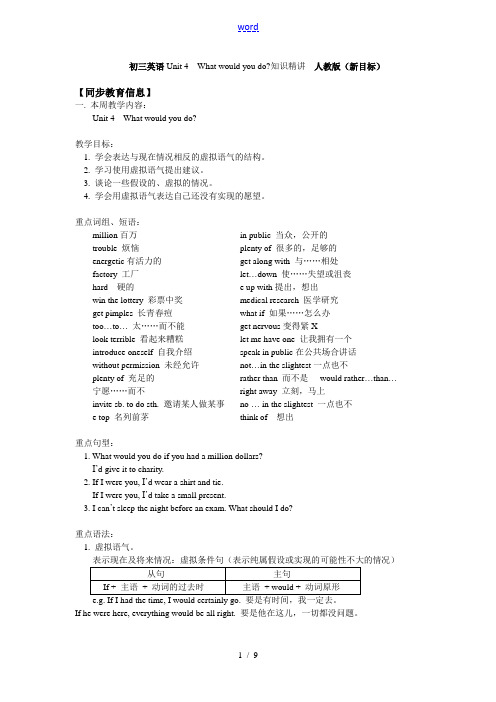
初三英语Unit 4 What would you do?知识精讲人教版(新目标)【同步教育信息】一. 本周教学内容:Unit 4 What would you do?教学目标:1. 学会表达与现在情况相反的虚拟语气的结构。
2. 学习使用虚拟语气提出建议。
3. 谈论一些假设的、虚拟的情况。
4. 学会用虚拟语气表达自己还没有实现的愿望。
重点词组、短语:million百万in public 当众,公开的trouble 烦恼plenty of 很多的,足够的energetic有活力的get along with 与……相处factory 工厂let…down 使……失望或沮丧hard 硬的 e up with提出,想出win the lottery 彩票中奖medical research 医学研究get pimples 长青春痘what if 如果……怎么办too…to…太……而不能get nervous变得紧Xlook terrible 看起来糟糕let me have one 让我拥有一个introduce oneself 自我介绍speak in public在公共场合讲话without permission 未经允许not…in the slightest一点也不plenty of 充足的rather than 而不是would rather…than…宁愿……而不right away 立刻,马上invite sb. to do sth. 邀请某人做某事no … in the slightest 一点也不e top 名列前茅think of 想出重点句型:1. What would you do if you had a million dollars?I’d give it to charity.2. If I were you, I’d wear a shirt and tie.If I were you, I’d take a small present.3. I can’t sleep the night before an exam. What should I do?重点语法:1. 虚拟语气。
人教版新目标初三上英语《第4章基础训练》答案
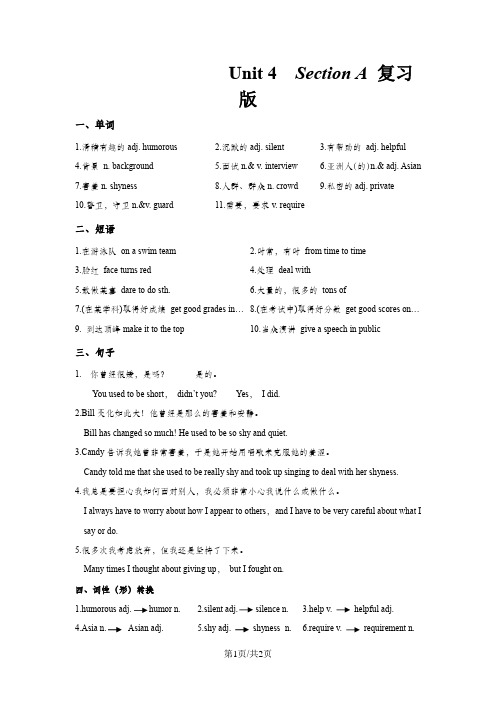
Unit 4Section A复习版一、单词1.滑稽有趣的adj. humorous2.沉默的adj. silent3.有帮助的adj. helpful4.背景n. background5.面试n.& v. interview6.亚洲人(的)n.& adj. Asian7.害羞n. shyness8.人群、群众n. crowd9.私密的adj. private10.警卫,守卫n.&v. guard11.需要,要求v. require二、短语1.在游泳队on a swim team2.时常,有时from time to time3.脸红face turns red4.处理deal with5.敢做某事dare to do sth.6.大量的,很多的tons of7.(在某学科)取得好成绩get good grades in…8.(在考试中)取得好分数get good scores on…9. 到达顶峰make it to the top10.当众演讲give a speech in public三、句子1.---你曾经很矮,是吗?---是的。
---You used to be short,didn’t you? --Yes,I did.2.Bill变化如此大!他曾经是那么的害羞和安静。
Bill has changed so much! He used to be so shy and quiet.3.Candy告诉我她曾非常害羞,于是她开始用唱歌来克服她的羞涩。
Candy told me that she used to be really shy and took up singing to deal with her shyness.4.我总是要担心我如何面对别人,我必须非常小心我说什么或做什么。
I always have to worry about how I appear to others,and I have to be very careful about what I say or do.5.很多次我考虑放弃,但我还是坚持了下来。
人教版新目标九年级英语Uni4单元复习课件U4复习课件
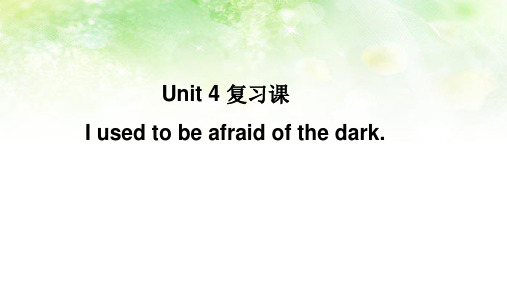
语法再现一:
1. used to意为“_过__去__常__常__”, 表过去的习惯 *used to +_动__词__原__形___ 2.我过去怕黑。_I_u_s_e_d_t_o__b_e_a_f_r_a_id__o_f_t_h_e_d_a_r_k. 否定句:I__d_id__n_’t_u__se__to__b_e_a_f_r_a_i_d_o_f_t_h_e_d__a_rk__. 一般疑问句:_D_i_d_y_o_u__u_s_e_t_o_b__e_a_f_ra_i_d__o_f _th__e_d_ark? 肯定回答: Yes, I did. 否定回答: No, I didn’t. 反义疑问句
2d重点短语
1、时常,有时 f_r_o_m___time__t_o__time 2、对付,应付 d__e_a__l __with 3、公开地 in _p_u_b__l_ic__ 4、为-------骄傲 be_p_r_o__u_d_ of 5、in person _亲___自___,__亲身 6、take pride in __为___--_-_-_-_--感到自豪
13、 interviewer (n.) ------_in__t_e_r_v_i_e_w (v.) 面试,采访 14、 shy (adj.) ------__s_h__y_n__e_ss (n.)害羞,腼腆 15、 speak (v.) ------__s_p__e_e__c_h (n.)讲话、发言 16 、pride (n.) ------___p_r_o__u_d_ (adj.)自豪的, 骄傲的 17、 introduce (v.) ------_in__t_r_o_d_u__c_t_i_on (n.) 介绍
You used to be afraid of the dark,_d__id_n__’t_y_o__u?
- 1、下载文档前请自行甄别文档内容的完整性,平台不提供额外的编辑、内容补充、找答案等附加服务。
- 2、"仅部分预览"的文档,不可在线预览部分如存在完整性等问题,可反馈申请退款(可完整预览的文档不适用该条件!)。
- 3、如文档侵犯您的权益,请联系客服反馈,我们会尽快为您处理(人工客服工作时间:9:00-18:30)。
